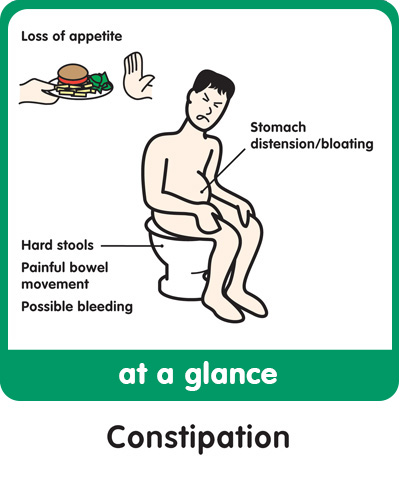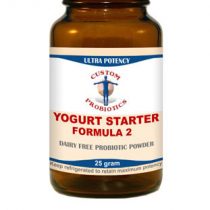Constipation

Constipation is passage of small amounts of hard, dry bowel movements, usually fewer than three times a week. People who are constipated may find it difficult and painful to have a bowel movement. Other symptoms of constipation include feeling bloated, uncomfortable, and sluggish. Here we are not concerned with occasional constipatiion that resolves itself after a few days; rather we are looking at chronic constipation, where it is the norm rather than the exception.
At one time or another, almost everyone gets constipated. Poor diet and lack of exercise are usually the causes. In most cases, constipation is temporary and not serious. To understand constipation, it helps to know how the colon (large intestine) works. As food moves through the colon, it absorbs water while forming waste products, or stools. Muscle contractions in the colon push the stool toward the rectum. By the time stool reaches the rectum, it is solid because most of the water has been absorbed.
The hard and dry stools of constipation occur when the colon absorbs too much water or if the colon’s muscle contractions are slow or sluggish, or there is an obstruction of some kind, causing the stool to move through the colon too slowly.
Common causes of constipation are:
Not enough fibre in the diet
Not drinking enough water
Lack of exercise
Medications
Irritable bowel syndrome
Changes in life or routine such as pregnancy, older age, and travel
Abuse of laxatives
Ignoring the urge to have a bowel movement
Specific diseases such as stroke
Problems with the colon and rectum
Problems with intestinal function (chronic idiopathic constipation)
Pure filtered water adds fluid to the colon and bulk to stools, making bowel movements softer and easier to pass. People who have problems with constipation should drink enough water every day, about eight 8-ounce glasses. Liquids that contain caffeine, like coffee and cola drinks, and alcohol have a dehydrating effect, and should be avoided if constipated.
Another common cause of constipation is a diet low in fibre found in vegetables, fruits, and whole grains and a diet high in fats found in cheese, eggs, and meats. People who eat plenty of high-fibre foods are less likely to become constipated.
Fibre—both soluble and insoluble—is the part of fruits, vegetables, and grains that the body cannot digest. Soluble fibre dissolves easily in water and takes on a soft, gel-like texture in the intestines. Insoluble fibre passes through the intestines almost unchanged. The bulk and soft texture of fibre help prevent hard, dry stools that are difficult to pass. Too much wheat bran fibre can irritate the gut, and cause IBS symptoms, so should be avoided. It should also be noted that grains, such as wheat and oats have quite a dehydrating effect on the gut. Try to have millet and brown basmati rice instead. Plenty of vegetables give the most effective sort of fibre.
Lack of exercise can also contribute to constipation, as rhythmic exercise decreases bowel transit times. Constipation may occur after an accident or during an illness when one must stay in bed and cannot exercise.
Some medications can cause constipation. They include:
Pain medications (especially narcotics)
Antacids that contain aluminum and calcium
Blood pressure medications (calcium channel blockers)
Antiparkinson drugs
Antispasmodics
Antidepressants
Iron supplements
Diuretics
Anticonvulsants
Laxatives usually are not necessary and can be habit-forming. The colon may come to rely on laxatives to bring on bowel movements. Over time, laxatives can damage nerve cells in the colon and interfere with the colon’s natural ability to contract.
Some people have chronic constipation that does not respond to standard treatment. This rare condition, known as idiopathic (of unknown origin) chronic constipation may be related to problems with intestinal function such as problems with hormonal control or with nerves and muscles in the colon, rectum, or anus. Functional constipation occurs in both children and adults and is most common in women.
Colonic inertia and delayed transit are two types of functional constipation caused by decreased muscle activity in the colon. These syndromes may affect the entire colon or may be confined to the lower or sigmoid colon.
The clinical definition of constipation is any two of the following symptoms for at least 12 weeks (not necessarily consecutive) in the previous 12 months:
Straining during bowel movements
Lumpy or hard stool
Sensation of incomplete evacuation
Sensation of anorectal blockage/obstruction
Fewer than three bowel movements per week
Mainstream treatments include:
Betalactulose – an absorbable sugar that promotes bowel movements, available on prescription only.
Calcium polycarbophil – increases hydration in the colon.
Magnesium – also increases the amount of water in the colon, and stimulates the peristalsis movement of the colon.
Prokinetics – stimulate movement of the smooth muscles of the colon.
PEG – (polyethylene glycol) pulls water into the colon by osmosis.
Complementary treatments include:
Psyllium husks; wheat bran; oat bran; flaxseeds; cellulose fibre.
Showing all 4 results
-

Custom Probiotics 11 Strain Probiotic Powder 100g
£165.00 Add to cart -

Custom Probiotics 6 Strain Probiotic Powder
£144.50 Add to cart -

Custom Probiotics Yoghurt starter probiotic powder Culture One 25g
£55.00 Add to cart -

Custom Probiotics Yoghurt Starter probiotic powder Culture Two 25g
£55.00 Add to cart
Showing all 4 results